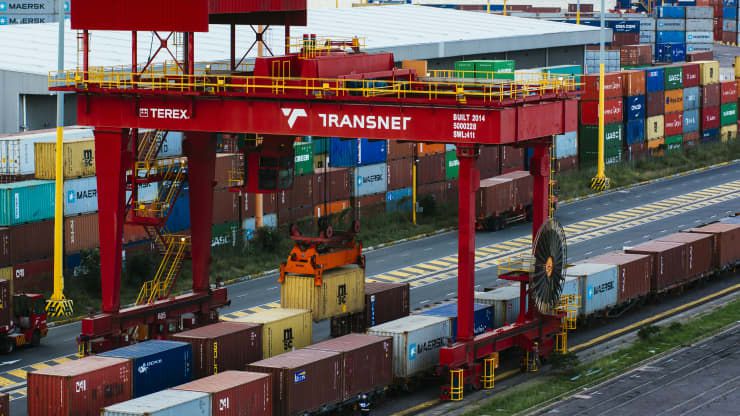Business
Shutdown Showdown: Transnet Risks Collapse in Feud With IT Provider Gijima

Inside the escalating IT disaster threatening South Africa’s vital state-owned logistics network
If you think a computer password can’t shut down an entire country’s supply chain, think again. South Africa’s state-owned logistics operator, Transnet, is currently balancing on the edge of a full-blown IT meltdown, caught in a high-stakes standoff with its outgoing IT service provider, Gijima.
What started as a contractual handover has spiraled into a chaotic tech crisis that could halt the country’s rail, port, and pipeline operations and expose yet another example of political interference and mismanagement in state-owned entities.
A Midnight Switch-Off Sparks Mayhem
It was just before midnight on 12 December 2024 when Gijima complied with Transnet’s instruction to cut off all services. Transnet, determined to bring IT operations in-house, told the company to surrender all system passwords and walk away.
But almost immediately after the plug was pulled, panic broke out. Gijima says over 6,000 support calls flooded in from Transnet employees who found themselves locked out of core operational systems. From cargo tracking to train scheduling and billing, everything came to a standstill.
This wasn’t just a systems hiccup. It was a full-blown operational seizure.
According to Gijima COO Sylvester Samuel, the transition was doomed from the start. “These systems are integral to the organisation’s daily operations and will bring Transnet to a standstill if there’s any interruption,” he warned. And without a suitable mainframe to transfer the data to, Transnet’s demand for a handover was technically impossible, Gijima argues.
Transnet Says: Hand Over and Go
Transnet, however, tells a very different story. The company has denied Gijima’s version, maintaining it has the capacity to manage its own systems and that Gijima must simply hand over access credentials and exit.
In typical state-corporate fashion, this tug-of-war has now spilled into the courts. What’s at stake? National logistics — including ports like Durban and Cape Town, major freight rail lines, and fuel pipelines — and the country’s fragile economic flow.
Toxic History: Gijima vs. T-Systems
This disaster isn’t happening in a vacuum. It’s rooted in a long, messy saga involving Transnet’s previous IT provider, T-Systems, which received a R2.5-billion contract in 2017, even though Gijima scored higher in the tender process and offered services at nearly half the cost.
So why didn’t Gijima get the deal in the first place?
Back then, Transnet directors expressed “political aversion” to Gijima, despite court orders and National Treasury interventions. Leaked meeting recordings revealed stunning admissions — including one former executive saying he was “happier getting sued by Gijima” than removing the “incumbent we helped create.”
That “incumbent,” T-Systems, had done business with companies tied to the controversial Gupta family, including Zestilor, owned by the wife of a known associate.
In 2019, after a drawn-out legal fight, Gijima finally won the contract, only to have it terminated again at the end of 2024.
Why This Matters to Every South African
If Transnet’s operations grind to a halt, the impact will ripple far beyond servers and cables. Freight delays, port congestion, fuel shortages, and export losses could follow — just as the economy struggles to recover from years of load-shedding and poor governance.
And this isn’t just about passwords or tech. It’s about trust. Transnet’s crisis illustrates how public institutions are still plagued by short-term decisions, politically motivated procurement, and an aversion to accountability.
What Social Media Is Saying
On social media, frustration is mounting.
“South Africa’s state IT is a joke. We’re a digital banana republic now,” wrote one user on X.
Another tagged Transnet, saying: “You people better fix this before my shipment from China sits in Durban for two months again.”
There’s also growing sympathy for Gijima, with calls to audit all state IT contracts and “clean house at SOEs for good.”
Commentary: A National Wake-Up Call
This is more than an IT failure. It’s a national systems failure, one where transparency, competence, and public interest were sacrificed at every step.
Until procurement is truly free of political interference and SOEs are run on merit and skill, South Africa will remain vulnerable to avoidable disasters like this.
A country’s ports and railways should never hang by a password. Yet here we are.
Transnet Secures Labour Peace with 6% Wage Deal, But at What Cost?
{Source: My Broad Band}
Follow Joburg ETC on Facebook, Twitter , TikTok and Instagram
For more News in Johannesburg, visit joburgetc.com


























